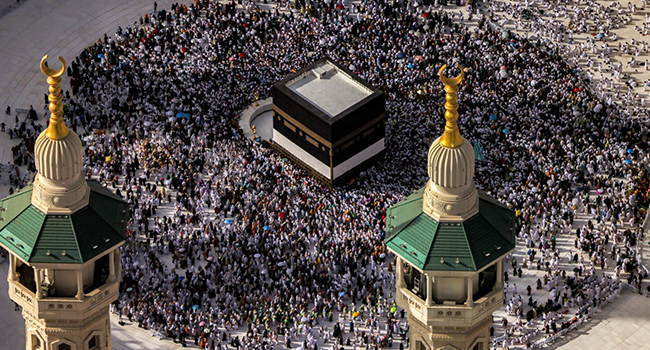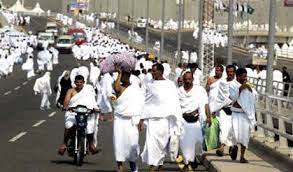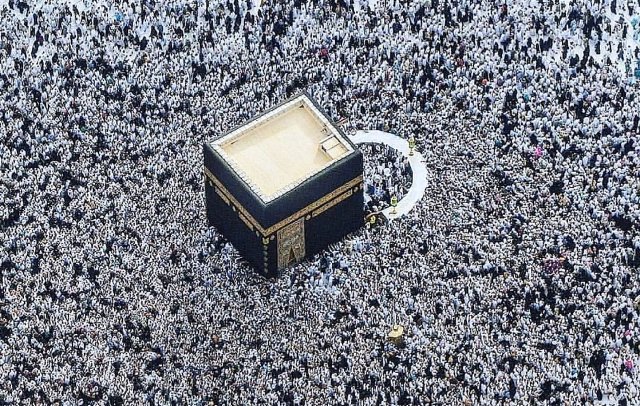We have a measurement problem eloquently illustrated in a Yoruba tale about a Mecca has-been. The fellow in this tale had just returned from a pilgrimage to Mecca, apparently the first to do so in his community. Upon his return, folks were understandably curious and wanted to know about the Holy Land.
Thinking of what would best illustrate the majestic splendour of Mecca, the sojourner decided to use a native fowl as an example.
“You all know our native fowl?,” he began.
“Of course!,” his curious, attentive listeners chorused.
“The fowl in Mecca is as big as a cow, if not bigger!,” he told them.
“Oh no!,” one rather incredulous listener said, amidst the rapturous gasps of h-e-n-e-n-h-e! “Big as a cow or big as a goat?”
“Ok,” the sojourner replied, “Let’s say it’s as big as a goat!”
“Oh no!,” the incredulous interlocutor reposed again. “Big as a goat or as big as a rabbit?”
This encounter continued until the sojourner, lowering his hand each time he was challenged, grudgingly lowered it until the point where nearly everyone finally concluded that the size of the fowl of Mecca was not significantly different from the size of the local one.
The tale of the fowl of Mecca is a metaphor of our census dilemma. We have spent nearly 60 years counting ourselves and yet, the answer to Nigeria’s census question is: it depends on whose hand is at play.
The Nigerian Population Commission (NPC) estimates that Nigeria is 218 million; the National Bureau of Statistics (NBS) puts the figure at “over 200 million”; while the UNFPA and the World Bank estimate Nigeria’s population at between 216 million and 218 million, or thereabouts.
Former President Goodluck Jonathan even said at a recent event that Nigeria is not 200m. “Far from it,” he reportedly said on April 14. “We should be about 150m.”
As things stand, Nigeria is in the company of Afghanistan, DR Congo, Uzbekistan, Madagascar, Eritrea and Lebanon as countries without a census population. The only thing certain about the Lebanese population, for example, is that there are more Lebanese in the Diaspora than at home!
The recent attempt to have another count in Nigeria, already overdue by 17 years, has been postponed indefinitely. After a hasty meeting on Friday night between President Muhammadu Buhari and the Chairman of NPC, Nasir Isa Kwarra, the Federal Government announced that it had decided to let the incoming administration handle the census.
The postponement did not surprise me. After years of doing nothing, the Board of 36 commissioners and a relatively unknown chairman have become so used to pay and prestige without work that getting any serious census off the ground was always going to be a tough job.
Ten years ago, former Managing Director of Nigerian Breweries Plc and Chairman of NPC, Festus Odimegwu, was forced to resign his position because he said Nigeria could not have a meaningful census except certain fundamental changes were made.
He said at the time, “If the current laws are not amended, the planned 2016 census will not succeed.” By that, of course, he meant laws that make the population of states a basis for the sharing of oil revenues and political representation.
His comment ruffled feathers. President Jonathan who already had his back to the wall sacked Odimegwu to appease deeply offended interests in the North who thought the NPC chairman could not be trusted to conduct a credible census.
It turned out, however, that Jonathan’s sacrifice was neither enough to secure him Northern sympathy in the 2015 election nor did the census hold as planned in 2016. His successor, Muhammadu Buhari, after promising to hold the census in May 2023 has now kicked the can down the road, with no shortage of excuses.
The most obvious one was the shift in the date of the governorship and state house of assembly elections. The NPC said the shift in state elections from March 11 to 18 complicated its original plans to have the census between March 29 and April 2.
That is potentially true, but mainly false. The shift by one week may have momentarily affected NPC’s planning and execution, but only momentarily. The Commission was not ready, simple. Apart from those in its glass-panelled offices in Abuja and a few staff in the states, NPC has been very busy talking to itself.
It was not the shift in election dates by a week that complicated NPC’s problem. Its unseriousness was worsened by widespread complaints about the failure of the Independent National Electoral Commission’s (INEC) bimodal verification system. NPC was deeply worried by the prospects of a flawed count piling on the unresolved BVAS mess.
Another sign of unpreparedness was the questionnaire – the basic instrument for the 2023 census. On April 14, the NPC Director of Public Affairs, Dr. Isiaka Yahaya, was quoted to have said in Kano that the Commission would not ask questions about religion and ethnicity in the census!
Why not? What is it about respondents’ religion and ethnicity that NPC is so afraid of that it desperately wants to expunge from the questionnaire?
If there was anything that needed a review, it is the often-weaponised “state of origin” which could have been replaced with “state of residence,” for example. But to pretend that it’s OK to strike out religion/non-religion and ethnicity and make us a bunch of aliens is, well, largely alien to population census. I don’t know where this idea is coming from or what NPC hopes to achieve.
But none of the countries I have searched turned up this demographic insanity. Not India, the world’s largest multi-ethnic democracy, where everything from caste to mother-tongue and migration status is required; not South Africa or Kenya; and certainly not Ghana, Nigeria’s neighbour.
Yet, what these countries have in common, but which Nigeria lacks, is significant degree of reliability in primary data on births, deaths, school enrolments, migrations and so on, managed in secure systems and regularly updated. Without reliable primary data, any census conducted — whether every five, seven or ten years — is a waste of time. And without this data also, no reliable planning or forecast is likely.
It would seem that the real elephant in the room, though, is that the NPC knows the Bola Ahmed Tinubu government would reject the outcome of a census rammed down the country’s throat with only days before President Muhammadu Buhari’s administration leaves.
They’re dealing with a familiar customer. It was Lagos State, under Tinubu, that dragged the Federal Government to the tribunal over the 2006 census, on grounds that the state’s population had been underreported by nearly half its size.
The current Lagos Deputy Governor, Femi Hamzat, who was the Commissioner for Science and Technology at the time, produced a book on behalf of the state, entitled, “Errors, Miscalculations and Omissions: The Falsification of Lagos Census Figures,” which essentially said that instead of the 9.1 million which the NPC had awarded the state, its own shadow census showed the state actually had a population of 17.6 million.
Nothing much came out of the legal challenge, but Odimegwu’s complaint seven years later re-echoed the sentiments of Lagos and significantly explains the scramble, this time, to nick the census before May 29.
If Kwarra and his commissioners are deceiving themselves, Buhari knows that Tinubu’s government will not accept any census result under the current circumstances. That is why the census was postponed.
Yet, given the current structure of the country, especially the conservatively dominated National Assembly, it would be difficult to have a credible census, even under Tinubu, without a review of the law that makes population the basis of sharing oil money.
Under the “horizontal sharing” formula of 26.72 percent of revenue in the federation account, for example, population accounts for 30 percent. This figure could be cut to 10 percent; while internal revenue which currently gets 10 percent could be increased to 30 percent.
Appeals not to politicise the census is empty, self-serving noise. Politicians will not relent, unless there is also a countervailing legislation that ties the extent and scope of Federal intervention in states to the taxes or royalties collected from the states and, fundamentally, to how much wealth the states themselves create.
Nothing short of a drastic action will cut the politics of our census fowl to its true size.
Ishiekwene is Editor-In-Chief of LEADERSHIP




